Grodków
Grodków [ˈɡrɔtkuf] (![]()
![]()
- For the village in Silesian Voivodeship, see Gródków. For the German-American socialist, see Paul Grottkau.
Grodków | |
|---|---|
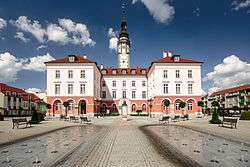 Town Hall in Grodków | |
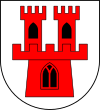 Coat of arms | |
 Grodków | |
| Coordinates: 50°41′N 17°22′E | |
| Country | |
| Voivodeship | Opole |
| County | Brzeg |
| Gmina | Grodków |
| First mentioned | 1210 |
| Town rights | 1268 |
| Government | |
| • Mayor | Marek Andrzej Antoniewicz |
| Area | |
| • Total | 9.88 km2 (3.81 sq mi) |
| Elevation | 172 m (564 ft) |
| Population (2019-06-30[1]) | |
| • Total | 8,595 |
| • Density | 870/km2 (2,300/sq mi) |
| Time zone | UTC+1 (CET) |
| • Summer (DST) | UTC+2 (CEST) |
| Postal code | 49-200 |
| Car plates | OB |
| Website | http://www.grodkow.pl |
History
The area was included in the emerging Polish state around 990 by its first historic ruler Mieszko I of the Piast dynasty[2] and after the 12th-century fragmentation of the realm it was part of the Polish duchies of Silesia and Brzeg. The settlement of villa Grodcobichi in the Duchy of Silesia was first mentioned in a 1210 deed. Its name is of Polish origin and comes from the word gród, which means "stronghold" in Polish.[3] The neighbouring settlement of Nowy Grodków (Neu Grottkau) was laid out by German settlers in the course of the Ostsiedlung, it was granted town rights modeled on Środa Śląska in 1268 by the Silesian duke Henryk IV Probus. Defensive walls were built in 1296.[2] Also in the 13th century the Gothic St. Michael's Church, one of the most distinctive and valuable historic landmarks of Grodków, was built. The medieval city plan was characterized by a rectangular marketplace and four streets leading to the towers of the city gates and the nearby towns of Nysa, Ziębice, Wrocław and Lewin. In 1308 it was granted staple right.[4] Upon the 1311 partition of the Silesian duchy, Grodków fell to the Duchy of Brzeg ruled by Duke Bolesław III the Generous, who became a Bohemian vassal in 1327. In 1344 he sold the town to Bishop Przecław of Wrocław, who attached it to his Silesian Duchy of Nysa. Later their suzerain, the Bohemian king Wenceslaus, granted the Wrocław bishops the title of a "Duke of Grodków", which they retained until the secularisation of the bishopric in 1810.
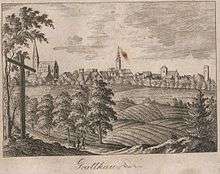
Grodków was devastated during the Hussite Wars and again in the Thirty Years' War, after which it was rebuilt under the rule of its native son Bishop Sebastian von Rostock. With the Bohemian kingdom, the town was incorporated into the Habsburg Monarchy in 1526. After the First Silesian War of 1740–42, it was annexed by King Frederick the Great of Prussia, the Prussian garrison established after the Seven Years' War in 1763 was not disbanded until 1920. From 1815 onwards, under the Germanized name Grottkau,[3] it was part of the Silesia Province. Its population was predominantly Catholic.[2]
The town had 4,867 inhabitants in 1939 and was a district seat (Landkreis Grottkau) until 1945. During World War II the Germans established a forced labour camp and two prisoner-of-war labour camps in the town.[4] The town was heavily damaged during the Vistula–Oder Offensive of the Red Army and after the war it was finally restored to Poland.
Economy
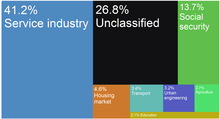
Grodków is the centre for commerce, business and industry in the regional locality of Gmina Grodków.[5] The town's gmina is largely dependent on the agricultural sector, due to the Opole Voivodeship's fertile soil, being a major factor in the town's economy alike.[6] The town has a department for the local shopping chain "Wimar Bort", located by Henryk Sienkiewicz Street (ul. Henryka Sienkiewicza). The settlement has a major industrial complex located to its north, including: "Grodkono" waffles food production; "Nalewki Kresowe" producing the Polish alcoholic beverage nalewka, as well as a vulcanisation plant, all located by Lipowa Street (ul. Lipowa).
Transport
Grodków is located south of the Przylesie interchange (Węzeł Przylesie), connecting the Voivodeship Road 401 to the A4 motorway. The town has a railway station, with the Nysa–Grodków–Brzeg line crossing through the city.[7]
Climate
| Climate data for Grodków (1985–2015) | |||||||||||||
|---|---|---|---|---|---|---|---|---|---|---|---|---|---|
| Month | Jan | Feb | Mar | Apr | May | Jun | Jul | Aug | Sep | Oct | Nov | Dec | Year |
| Average high °C (°F) | 2.0 (35.6) |
3.0 (37.4) |
8.0 (46.4) |
14.0 (57.2) |
19.0 (66.2) |
22.0 (71.6) |
24.0 (75.2) |
25.0 (77.0) |
20.0 (68.0) |
15.0 (59.0) |
8.0 (46.4) |
3.0 (37.4) |
13.6 (56.5) |
| Daily mean °C (°F) | −1.0 (30.2) |
0.0 (32.0) |
8.0 (46.4) |
11.0 (51.8) |
11.0 (51.8) |
16.5 (61.7) |
19.0 (66.2) |
19.5 (67.1) |
15.0 (59.0) |
10.0 (50.0) |
4.5 (40.1) |
0.5 (32.9) |
9.5 (49.1) |
| Average low °C (°F) | −3.0 (26.6) |
−3.0 (26.6) |
0.0 (32.0) |
3.0 (37.4) |
8.0 (46.4) |
11.0 (51.8) |
14.0 (57.2) |
14.0 (57.2) |
10.0 (50.0) |
5.0 (41.0) |
1.0 (33.8) |
−2.0 (28.4) |
4.8 (40.6) |
| Average precipitation mm (inches) | 37 (1.5) |
32 (1.3) |
40 (1.6) |
36 (1.4) |
64 (2.5) |
59 (2.3) |
70 (2.8) |
57 (2.2) |
44 (1.7) |
28 (1.1) |
38 (1.5) |
37 (1.5) |
542 (21.3) |
| Average precipitation days | 13.5 | 12.7 | 13.8 | 11.3 | 14.1 | 14.8 | 14.7 | 11.9 | 10.5 | 8.9 | 11.6 | 13.6 | 151.4 |
| Source: meteoblue.com[8] | |||||||||||||
Sports
Handball club Olimp Grodków is based in the town.
Notable people
_(2).jpg)
- Melchior Adam (1575–1622), literature historian
- Sebastian von Rostock (1607–1671), Bishop of Wrocław
- Sylvius Leopold Weiss (1687–1750), composer
- Józef Elsner (1769–1854), composer, teacher of Fryderyk Chopin
- Julius von Roeder (1806–1889), Prussian General
- Johannes Ronge (1813–1887), founder of the German Catholics, worked as a chaplain at the Grottkau parish church from 1840 to 1843.
- Bruno von Kern (1860–1932), Prussian General
- Hans-Georg Herzog (1912–1959), Wehrmacht officer
- Helmut Scholz (1920–1997), German officer
- Adam Gardzina (born 1952), former Polish basketball player and member of Poland men's national basketball team
- Henryk Mrowiec (born 1960), former Polish handball player and member of Poland men's national handball team
- Marek Pazdur (born 1960), former Polish handball player and member of Poland men's national handball team
- Piotr Gacek (born 1978), former Polish volleyball player and member of Poland men's national volleyball team
- Marek Gancarczyk (born 1983), Polish footballer
- Jan Klimków (born 1998), Polish handball player and member of Poland men's national handball team
Twin towns – sister cities
See also
References
- "Population. Size and structure and vital statistics in Poland by territorial divison in 2019. As of 30th June". stat.gov.pl. Statistics Poland. 2019-10-15. Retrieved 2020-02-14.
- "Historia". Urząd Miejski w Grodkowie. Retrieved 14 March 2020.
- Heinrich Adamy, Die Schlesischen Ortsnamen ihre entstechung und bedeutung, 1888, p. 10 (in German)
- "Grodków". Encyklopedia PWN (in Polish). Retrieved 14 March 2020.
- "Grodków". www.polskawliczbach.pl (in Polish). Retrieved 31 January 2017.
- "Wydział Ekonomiczny - Uniwersytet Opolski | Kierunki kształcenia: Ekonomia, Gospodarka przestrzenna - studia inżynierskie, Logistyka, Zarządzanie". we.uni.opole.pl (in Polish). Retrieved 31 January 2017.
- Konopska, Renata Pysiewicz-Jędrusik, Andrzej Pustelnik, Beata (1998). Granice Śląska: zmiany granic Śląska w czasie i przestrzeni, Śląsk na dawnej mapie, obraz Sudetów w dawnej kartografii (Wyd. 2., popr. ed.). Wrocław: Rzeka. ISBN 8391153207.
- "Klimat Grodków". meteoblue (in Polish). Retrieved 23 August 2017.
![]()
External links
- (in Polish) biggest website
- (in Polish) Municipal website
- (in German) Heimatstube der Grottkauer
- Jewish Community in Grodków on Virtual Shtetl
| Wikimedia Commons has media related to Grodków. |
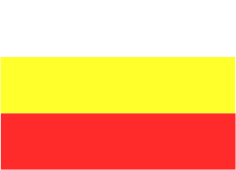
_ID_609910.jpg)